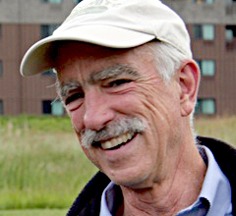Sustainable Food Lab
Purpose Prize Fellow 2012
Hamilton fosters collaborations among large businesses, farmers and conservationists to bring sustainable food production from niche market to mainstream.
A child of the activist ’60s, Hal Hamilton spent decades in Kentucky as a farmer, rural community activist and nonprofit director. He helped pioneer alternative food and agricultural systems that are kind to the environment and provide a livelihood for small farmers – the hallmarks of sustainable food production.
By 2004, when Hamilton was 56, he had moved to Vermont to manage a nonprofit that conducted research on sustainability and consulted on local and regional sustainability projects. But he was frustrated that he wasn’t reaching the big agricultural corporations that dominated food production and distribution. He had an epiphany: For years he had blamed the corporations for their practices, rather than trying to collaborate with them to promote change from within.
Hamilton launched Sustainable Food Labs, which aims to take sustainability from niche to mainstream by bringing corporations, nongovernmental organizations and government agencies together to create profitable ways to develop sustainable food systems. The nonprofit has 61 participating organizations, which collaborate through summits, events and training.
As a result, Sysco and Costco now take part in large produce projects with small-scale Mayan farmers in Guatemala. And Sustainable Food Lab’s programs have been replicated in Malaysia, Brazil, South Africa and Japan.
The organization is now looking to the seas with plans to bring 50 percent of global fisheries under sustainable management within 10 years. “My sense is that the opportunities to have large-scale impact are increasing,” Hamilton says.




